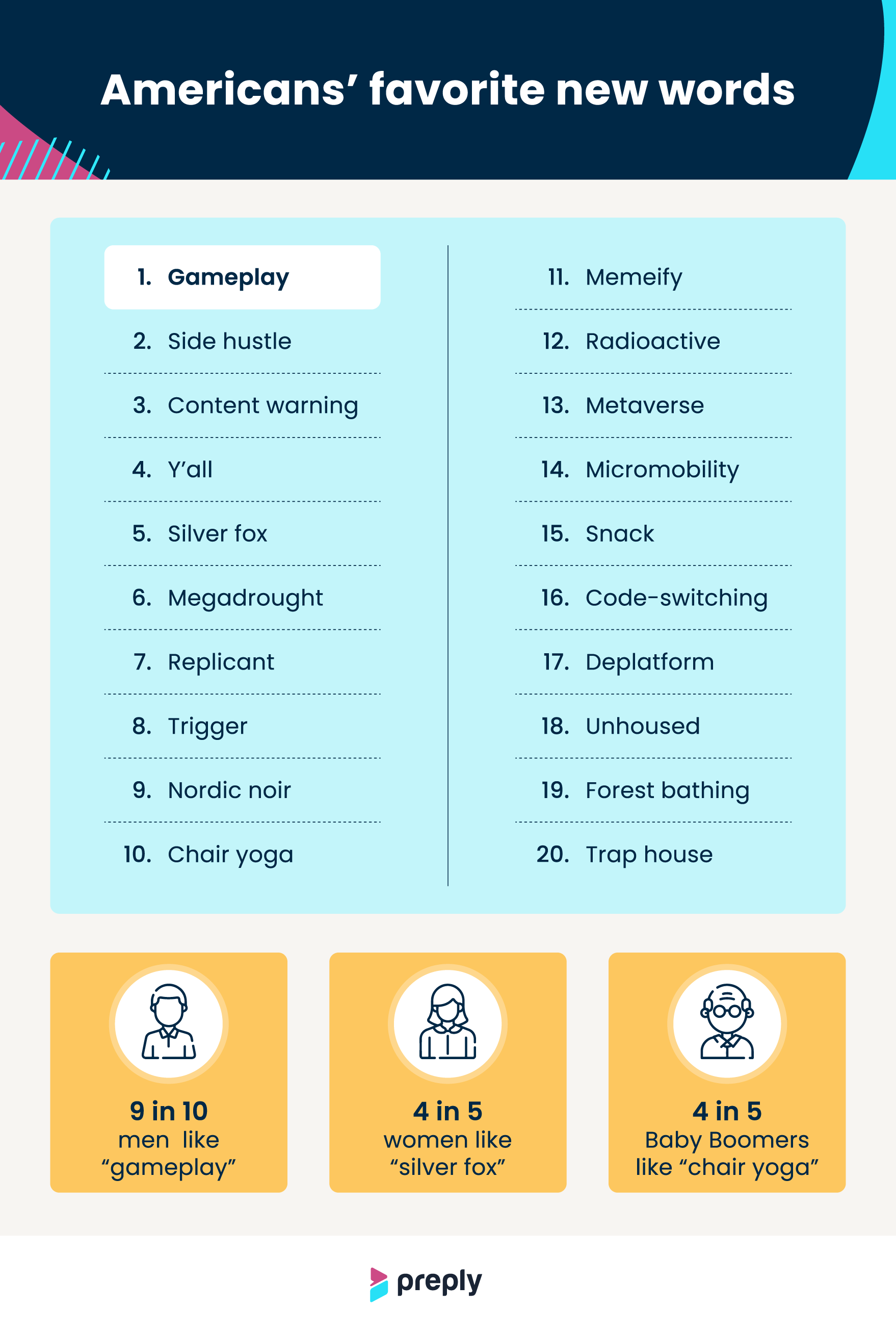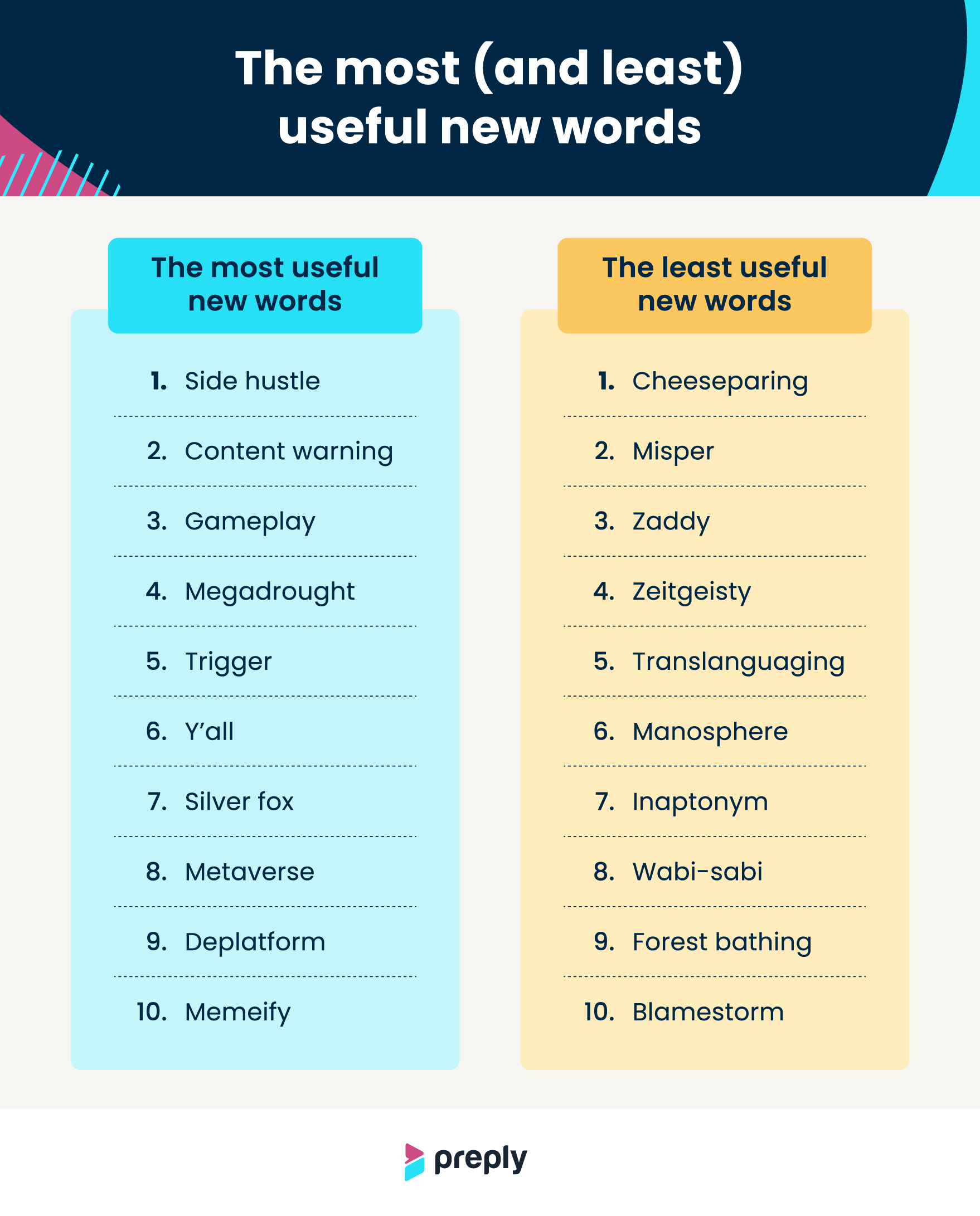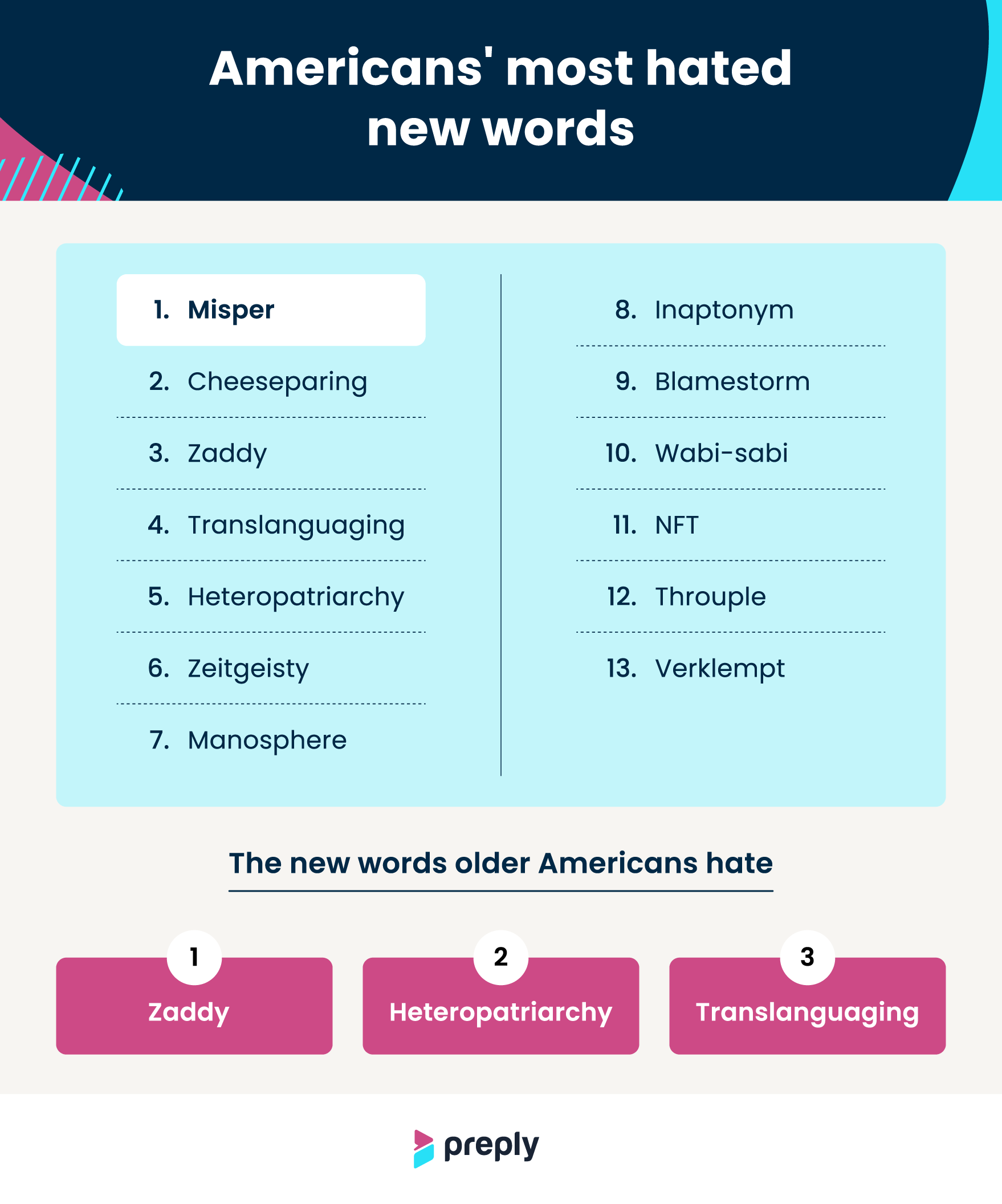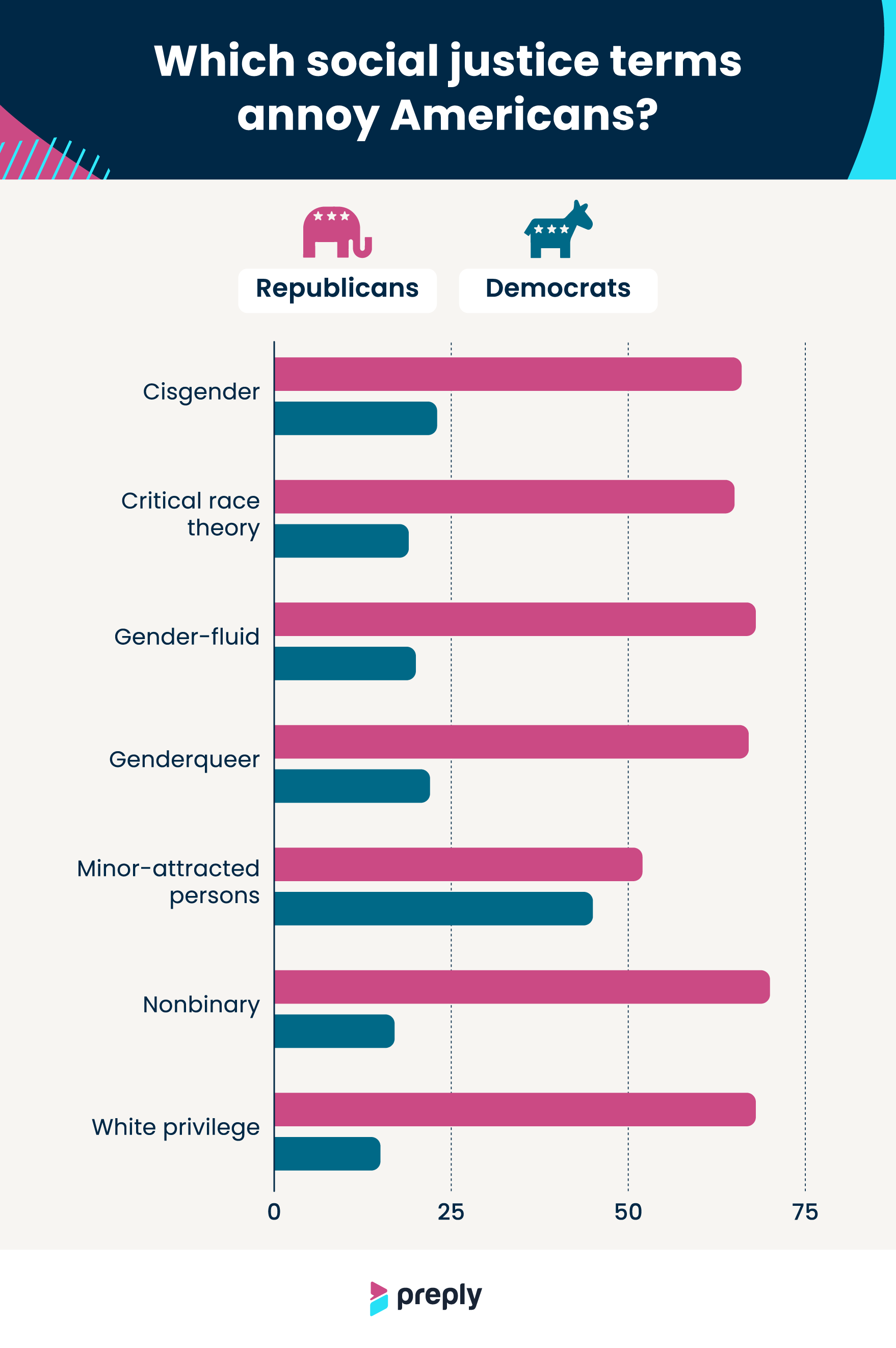

It happens all the time: Someone uses a word you’ve never heard before, and you do a quick Google search to find the definition, or check Urban Dictionary to see if it’s a slang term. The English language constantly evolves, and Dictionary.com has added over 200 words in the past year to keep up.
We wanted to find out which of these new words people like the most, which ones they actually plan to use and which ones just rub them the wrong way. To dig into opinions, we surveyed over 1,000 people from the U.S. and asked them to rate 33 freshly minted dictionary words and 23 social justice terms.
Key findings
- Americans’ favorite (and most functional) new words are “gameplay,” “side hustle” and “content warning.”
- The most hated additions are “misper,” “cheeseparing” and “zaddy.”
- Baby Boomers and Gen Xers are okay with “NFT” and “metaverse,” but can’t stand Millennial and Gen Z favorites like “snack” and “throuple.”
- Republicans are most annoyed by terms like “nonbinary” and “white privilege,” while “minor-attracted persons” bothers Democrats.
Americans’ favorite new words
These terms and phrases aren’t just euphemisms anymore — they’re dictionary official. Americans’ top five favorite dictionary additions from the past year are:
- Gameplay
- Side hustle
- Content warning
- Y’all
- Silver fox
“Side hustle” (a job that brings in extra income), “y’all” (you all) and “content warning” (a warning content may upset or offend) are universal favorites, but other preferences differ a bit by gender and age. 9 in 10 men enjoy “gameplay” (player experiences in video games), while 4 in 5 women are fond of “silver fox” (an attractive older man with gray or silver hair).


Yes, 4 in 5 Baby Boomers said they like the addition of “chair yoga” — but our survey also revealed older Americans may be getting on board with increasingly elaborate internet culture and its lingo:
- 7 in 10 Boomers and Gen Xers like “metaverse” (the shared, immersive digital world) compared to 61% of younger Americans.
- Just over half of older Americans also said they like “NFT” (a nonfungible token) compared to 44% of younger folks.
- 42% of the older generation even like “manosphere” (a network of masculine websites, blogs and forums) versus 35% of their younger counterparts.
Millennials and Gen Zers, on the other hand, prefer the new words that describe some of the more nuanced interactions of modern social life:
- Nearly two thirds of younger Americans like “deplatform” (to prohibit a person from sharing on social media websites and apps) versus about half of older Americans
- Almost 2 in 5 also like “translanguaging” (the integrated use of all language systems a person speaks), compared to 29% of older Americans.
Baby Boomers might like “silver fox,” but younger Americans are more comfortable with sexy slang. They like “snack” (71%) — a sexy, physically attractive person; “throuple” (55%) — three people in a relationship; and even “zaddy” (40%) — an attractive man who is stylish, charming and confident.
The most useful new vocabulary
Of course, the new words people like the most aren’t necessarily the ones they actually use in conversation. We asked our respondents to tell us which words they think are useful, and which ones aren’t.
We found Americans think the five most useful new words are:
- Side hustle
- Content warning
- Gameplay
- Trigger
- Megadrought
In general, Americans think new words describing different aspects of virtual life are most useful. Nearly 9 in 10 said “gameplay” is a useful addition to the dictionary; 7 in 10 agreed “metaverse” is a useful word; and about 2 in 3 said “memeify” and “deplatform” are useful, too.
They also think words that describe modern sociopolitical dynamics are helpful additions to the dictionary. 9 in 10 Americans said “content warning” is a useful addition, and 4 in 5 agreed “trigger” (something that evokes a memory of trauma, causing a negative reaction) is useful as well.
4 in 5 Americans also agree “megadrought” (a severe drought lasting 20-plus years) is a useful new word — and this may only prove more true as climate change alters weather patterns.


Then you have the more obscure additions. Americans said the five least useful new words are:
- Cheeseparing
- Misper
- Zaddy
- Zeitgeisty
- Translanguaging
“Cheeseparing” (being economical or stingy) and “misper” (a missing person) top the list of duds — about 3 in 4 Americans said these words aren’t useful.
“Zaddy” and “translanguaging” might be relatively popular among the younger crowd, but on the whole, Americans don’t expect to use them much. A majority think “zeitgeisty” (relating to the general trend of thought) is pretty useless, too.
The new words Americans hate
Americans have words that they generally don’t find especially useful, and then Americans have new words that they just don’t like — but we found those words were often one and the same. The five new words Americans hate the most are:
- Misper
- Cheeseparing
- Zaddy
- Translanguaging
- Heteropatriarchy
“Heteropatriarchy” (a society dominated by heterosexual men biased against gay people and women) bumped “zeitgeisty” from the top five, with 63% of Americans saying they dislike this new word. Men (72%) are more likely to be upset by this addition than women (56%).


Some of these new words trouble older Americans a good deal more than younger ones. About 7 in 10 older Americans dislike “zaddy,” “heteropatriarchy” and “translanguaging.” Over 3 in 5 older Americans dislike “throuple,” and half hate “snack.”
What Americans think about new political terms
As the world around us changes and evolves, so does the language we use to describe it. Just as workplace jargon and personal slang goes in and out of style, the ways we talk about people and politics shift, too. We polled Americans with different political affiliations about 23 different political terms and asked them to tell us which, if any, annoy them in practice.
Overall, we found the newer gender- and race-related terms bothered Republicans the most; for example, 7 in 10 Republicans said they’re annoyed by the use of “nonbinary,” but older terms like “equity” and “discrimination” are much less polarizing.


Democrats were more tolerant of all the social justice terms we asked about, but 45% said they were annoyed by “minor-attracted persons” (individuals attracted to people who are minors or below the legal age of consent).
Conclusion
Many of Americans’ favorite new words are also among the most useful, either because they describe new phenomena (like “metaverse”) or seem socially relevant (like “content warning”). Younger folks may be much more open to new slang (like “throuple”) but older Americans are still keeping pace when it comes to changes in internet culture.
Whether or not you’re actively learning English, it might be time to brush up on your vocabulary — there’s a lot to learn. Test your knowledge with Preply’s vocab tool at home or on the go via our mobile app, or build up your vocab in real-time during a tutoring session.
Methodology: From May 18 to 19, 2022, we surveyed 1,012 Americans about new additions to dictionary.com and social justice terms. Of our respondents, 48% were women; 49% men; and 2% nonbinary. The average age was 39.
We also looked at political party affiliation: 49% of our respondents were Democrats; 15% Republicans; 30% Independents, and 6% had other affiliations.
TELL YOUR FRIENDS ABOUT CITIZENS JOURNAL Help keep us publishing –PLEASE DONATE




One of the lamest articles I’ve read. Creating words to make yourselves feel better.
I think that the one that annoys me the most is “cisgendered”. I don’t think that they needed to come up with a new expression for “normal”; however, “minor-attracted person” is right up there too. We used to just call them “pedophiles”, “child molesters” or “perverts”.